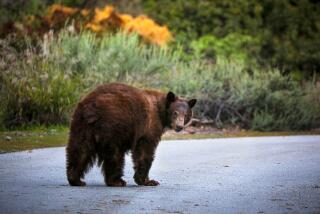High Prices for Bear Gallbladders Encourage Poaching
- Share via
SEATTLE — Black bear gallbladders are so popular in Asian medicine that poachers are starting to threaten the species in North America.
About 40,000 bears are legally hunted each year in the United States and Canada, but it’s estimated an equal number are poached, said John Doggert, chief of the law enforcement for the U.S. Fish and Wildlife Service.
“We’re finding carcasses with the gall bladder sliced out,” said Judith Ball, general curator for Seattle’s Woodland Park Zoo.
Animal protection advocates say measures must be taken now or the numbers of bears will become as depleted in North America as they are in Asia.
“This is an opportunity to address a problem before it becomes a crisis,” said Ginette Hemley of the Washington-based World Wildlife Fund.
In an attempt to do just that, the Wildlife Fund and Seattle’s Woodland Park Zoo sponsored a three-day conference at the University of Washington in September. It attracted about 100 fish and wildlife officials, species protection groups and government representatives from Southeast Asia.
The conference discussed the need for uniform bear-hunting laws in North America as well as efforts under way to persuade Asians to use synthetic bear bile.
Although black bears are not in danger of extinction in most states, their body parts garner astronomical prices on the international black market.
A U.S. hunter can sell a bear gallbladder for $20 to $120, with the retail price ranging from $75 to $600. Paws fetch $25 to $60 each, while a carcass or hide can range from $200 to $1,500, according to the World Wildlife Fund.
In Taiwan, however, gallbladders were selling in 1991 for $800 to $3,000. A cup of bear paw soup fetches up to $1,500 in some Taiwanese restaurants, researchers said.
Asian pharmacies stock bear bile salts as a cure for various intestinal, liver, fever and cardiac-related illnesses. Western science has recently begun to recognize the health benefits of the bear bile, effective as an antispasmodic, poison antidote and anti-coughing agent, as well as a treatment for gallstones and high blood pressure.
A synthetic alternative has been developed, but demand for the real thing remains high, Ball said.
The black bear is listed as endangered in Louisiana, and numbers are dwindling in Florida, according to the U.S. organization Defenders of Wildlife.
Idaho, Maine, New Hampshire, New York, Vermont, Virginia and Wyoming allow the sale of bear parts. But the international trade of bear parts is illegal without a permit, said Wim de Kok of the the World Society for the Protection of Animals, an association of humane societies in 17 countries.
Wildlife-advocacy groups believe Asia’s demand for bear bile is to blame for the depletion of most of Asia’s bear population. They fear the North American bear could be next.
Officials of the World Wildlife Fund and the World Society for the Protection of Animals say they are launching campaigns throughout Asia to persuade people not to use bear bile.
It will be difficult to alter such a deep-rooted tradition, they say.
In a survey of 50 traditional Chinese doctors in Korea, 92% said that bear bile is an essential part of their medical practice and that they would pay between $1,000 and $18,000 for a bear gallbladder, said Judy Mills, the World Wildlife Fund’s acting director in East Asia.
When asked if they would recommend substitutes to bear bile, 73% said they would consider other animals, 18% said herbs and 2% said synthetic substances.
“The culture prefers wild bear to captive bear and captive bear to synthesized bear,” Ball said.
An estimated 10,000 black bears are kept on farms in China with drains stuck into their gall bladders, to “milk” the bile, De Kok said.
“The continued captivity of bears on farms throughout China only serves to fuel the demand for these products, and forces thousands of bears to endure miserable lives of suffering,” said De Kok. “It is going to take a concerted worldwide effort to stop this brutal trade.”
More to Read
Sign up for Essential California
The most important California stories and recommendations in your inbox every morning.
You may occasionally receive promotional content from the Los Angeles Times.













